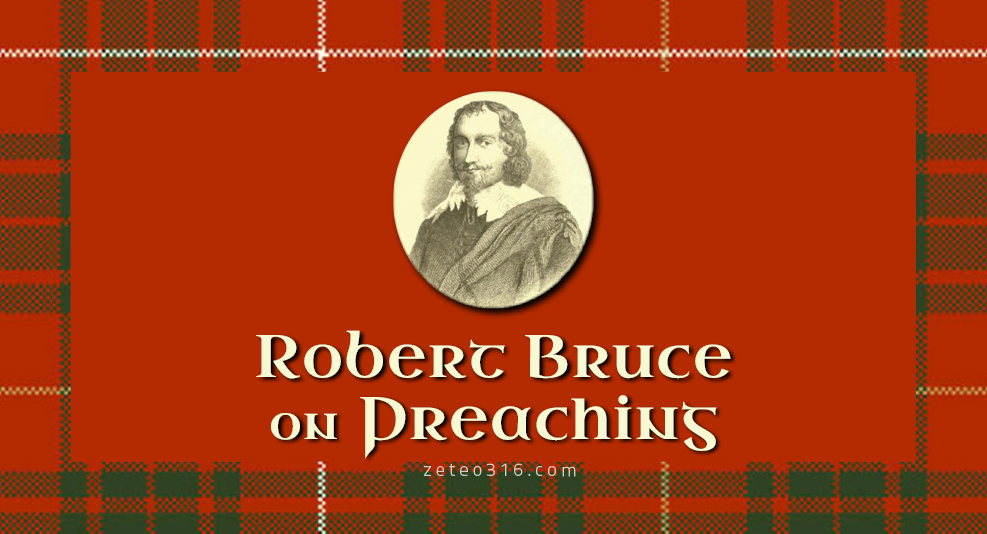Robert Bruce on preaching – don’t confuse this Bruce with the arguably more famous Robert the Bruce, King of Scotland. The following excerpt is taken from a Banner of Truth article on Robert Bruce the Great Preacher of Kinnaird, Scotland:
Whilst he was in the ministry at Edinburgh, he shined as a great light through the whole land, the power and efficacy of the Spirit most sensibly [palpably] accompanying the Word he preached. (Robert Fleming)
When it was known that Bruce was to preach, the people of the country around would flock together to hear him . . . The popularity of such preaching as his was one thing that helped to originate the great Communion gatherings that came to be such a marked feature of later Scottish religious life. . . Bruce is said to have been the means of converting several thousands of souls. (Principal John Macleod)
I recommend reading the Banner of Truth article for insights on Bruce’s character and holiness. We need to remember these great preachers of yesteryear so we can apply their lessons in our lives today. Here’s another excerpt:
On his final banishment to Inverness in 1622, having left his ancestral home at Kinnaird, he was accompanied part of the way by family, friends and a few ministers. When ‘he had taken his leave of them, and the whole company were mounting, his horse was brought out last.’ Just as he was setting his foot in the stirrup, Bruce stopped, and stood with his eyes fixed towards heaven, in a muse for nearly a quarter of an hour. The rest . . . rode softly on; and none of the company observed it but an intimate friend of his . . . His friend took the freedom to ask him what he was doing . . . Mr. Bruce answered him, ‘I was receiving my commission and charge from my Master to go to Inverness, and He gave it me Himself before I set my foot in the stirrup; and thither I go to sow a seed in Inverness that shall not be rooted out for many ages.’…keep reading
In his book Land of many Revivals, Tom Lennie gives us more inspirational insights:
On return from exile to Inverness, at a meeting in Edinburgh in 1626, a number of godly ministers met to discuss the bishops had for Scotland and the action they ought to take. Bruce was asked to pray. He began to pray about these issues and the lamentable state of the Kirk, and in the urgency of his plea for God’s help he unconsciously knocked upon the table at which they knelt. As he did so there was immediately ‘such an extraordinary motion on all present, so sensible a downpouring of the Spirit, as they could hardly contain themselves.’ John Wemyss, a minister in attendance, afterwards exclaimed, ‘O! how strange a man is this, for he knocked down the Spirit of God on us all.’ Equally remarkably, there were apparently some people in other parts of the house who knew nothing of the meeting, but who felt a deep sense of divine solemnity upon their spirits at the very moment Bruce knocked the table.
Even on his own, noted Calderwood, Bruce sometimes ‘felt God’s presence so sensibly with him that he could not contain himself in the night from breaking out in these words, “I am the happiest man that ever was born; happy that I ever served God.”‘ ~ Land of Many Revivals (pages 53-54)

